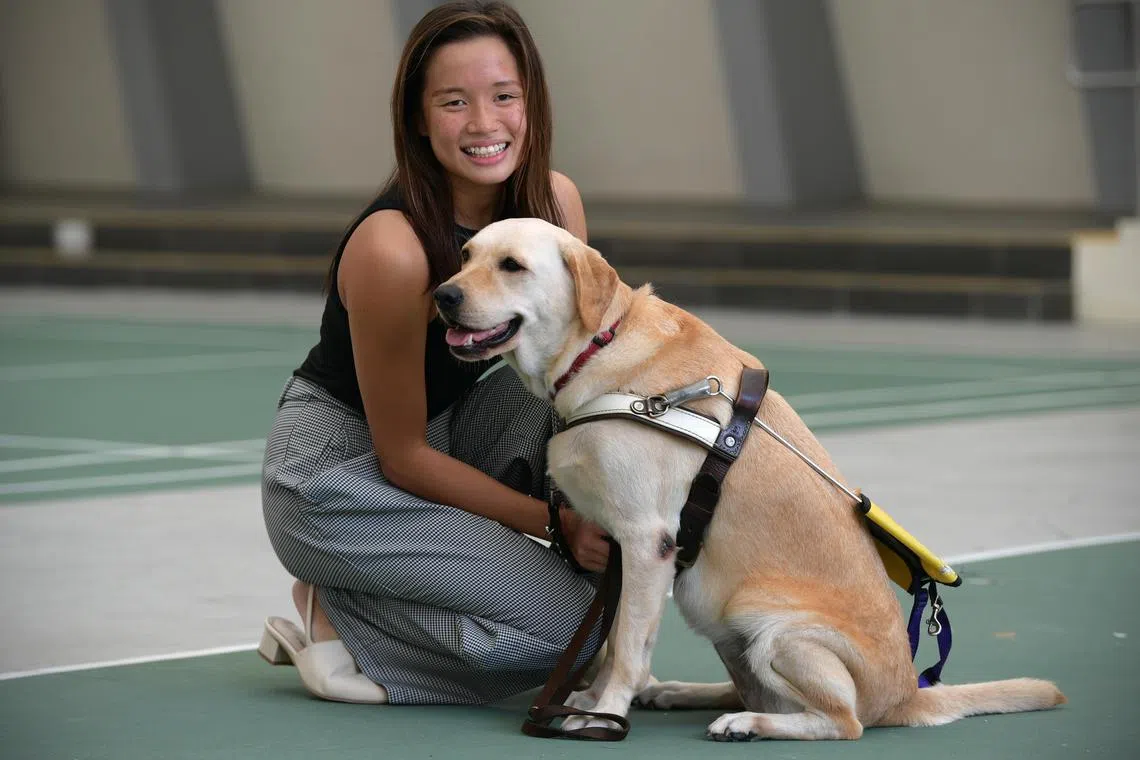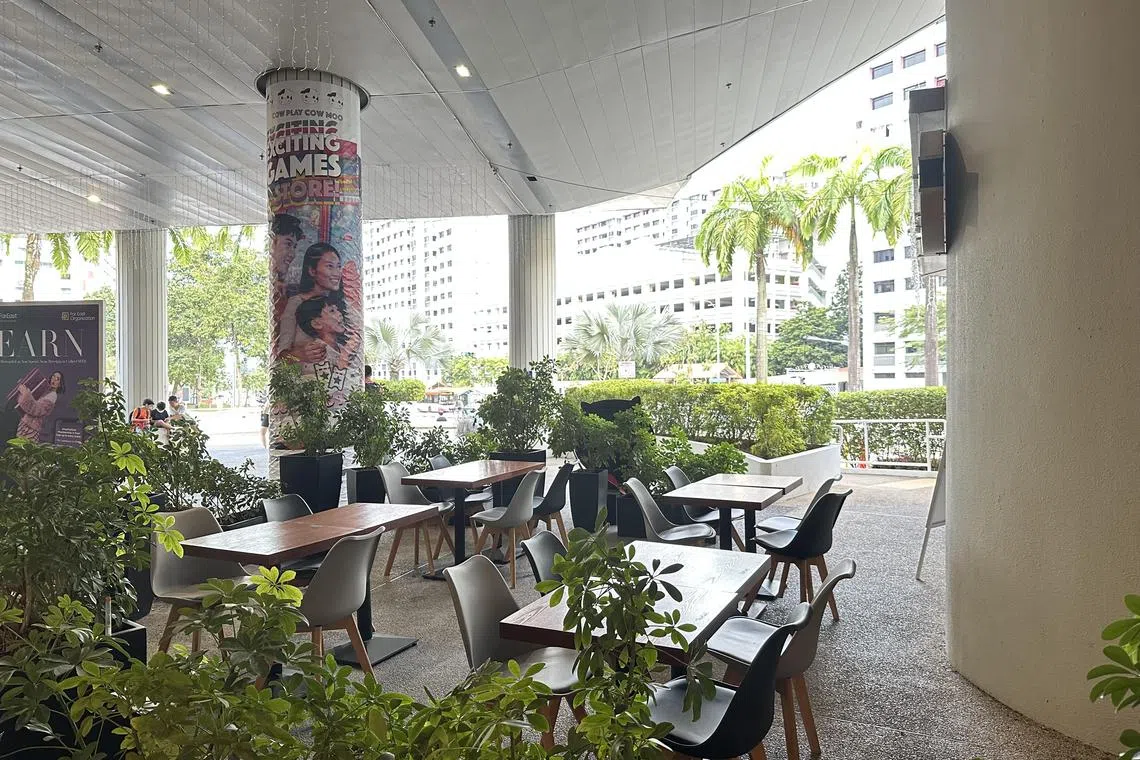Paralympian Sophie Soon’s dispute with cafe sheds light on guide dog users’ daily challenges
Sign up now: Get ST's newsletters delivered to your inbox

Paralympic swimmer Sophie Soon, who is visually impaired, confronted a Rocky Master employee in Hougang 1 mall over her guide dog Orinda.
PHOTO: ST FILE
SINGAPORE - While waiting to take the lift at an HDB block in Bedok, Mr Alvin Ng was told to wait for the next lift by a member of the public, as he had his guide dog with him.
On several other occasions, when the retiree in his 50s was dining out with his guide dog, he was asked to sit outdoors.
In a Facebook post on Sunday, Mr Ng said: “Once, the waiting staff (at a restaurant) led me to an outside dining area... It was noon and the temperature was high. It was hot for me, so it must (have been) terrible for my dog. I walked away.
“Another time, I had to leave my half-eaten food and run for cover when it rained suddenly... the place (was) covered, but not enough to shield the diners from heavy rain,” he said, adding that on both occasions, there were still available seats inside the restaurants.
“It’s either you dine outside or you bring your business somewhere else,” he said.
“Am I not a paying customer? How about my feelings? Does using a guide dog make me a lesser human being?”
A guide dog user since 2012, Mr Ng was sharing his experiences in response to an incident on March 8, when Paralympic swimmer Sophie Soon, who is visually impaired, confronted a Rocky Master employee in Hougang 1 mall
Ms Soon claimed the employee at the halal-certified cafe wanted her to agree to three conditions before allowing her to dine in: Her dog must be leashed, it must not be fed, and customers must not complain about the dog.
She shared a recording of what happened with the employee on her social media pages, but has since taken it down.
But the incident has highlighted the accessibility issues faced by visually impaired individuals with guide dogs in Singapore.
Guide dogs – which wear yellow harnesses indicating that they are working dogs – are approved and allowed on halal-certified premises, according to a Muis advisory.
The National Environment Agency and the Singapore Food Agency also allow guide dogs in restaurants, foodcourts and cafes.
In response to queries from The Straits Times, Guide Dogs Singapore (GDS), a social service charity formed in 2006, said guide dog users here face rejection about 50 to 70 per cent of the time when patronising a new place.
“Hence they tend to frequent the same places that welcome them to avoid the trouble of facing rejection which can be disruptive to their schedule and impact their social life... they might walk away on some occasions as this happens almost daily, and would sometimes just accept their fate,” said a spokesman.
GDS also said that more than 70 per cent of the time, food and beverage (F&B) places will request the guide dog users to be seated outdoors with their guide dogs, or farther away from other diners.
Some establishments would ask guide dog users to use a different entrance to walk to their table.
Employees who are not well-trained to handle such situations also prefer to err on the side of caution as they are concerned about complaints from other patrons, and not confident in handling them, said the GDS spokesman.
In some cases, employees are not well-informed about guide dogs. For example, they are not aware that the “no pets” signs should not apply to guide dogs.
“They are unaware of the stringent training a guide dog undergoes, where the guide dogs will be quietly tucked under the guide dog user’s seat or table and not cause any disturbances,” the spokesman said, adding that the guide dogs are taken to relieve themselves before entering indoor areas.

The recent incident between paralympic swimmer Sophie Soon and a Rocky Master employee sheds light on accessibility issues in Singapore.
PHOTO: SHIN MIN DAILY NEWS
Guide dog users also find it challenging to book a ride on taxis and private-hire vehicles. Some drivers think guide dogs are pets and refuse to accept their bookings. Others may drive off upon seeing the dog when they arrive at the pickup location, the GDS spokesman said.
“It takes an average of one hour for guide dog users to book a ride,” the spokesman said.
“As a result, most guide dog users prefer to take buses or trains instead to avoid going through the trouble.”
GDS hopes that with increased awareness and access for guide dogs, it will provide other visually impaired people “with the confidence to consider using a guide dog as a safe and effective mobility aid”.
“The bigger issue of the challenges our guide dog users face is that it hinders inclusivity and progress for the visually impaired community,” the spokesman said.
“It discourages economic empowerment and social integration for vision-impaired persons as it disempowers them to lead an independent life.”
GDS has trained 11 guide dog-and-user teams since its inception, and there are now six working teams, including Ms Soon and her guide dog Orinda.
Ms Soon on Sunday apologised to the Rocky Master outlet’s employee, manager and those who responded to her video, saying: “It was a poor move and poor judgment on my part for thinking that this (posting the recording online) is the way to resolve discrimination issues.”
Moving forward, she said she will work on posting “more positive content” to spread awareness about guide dogs.



